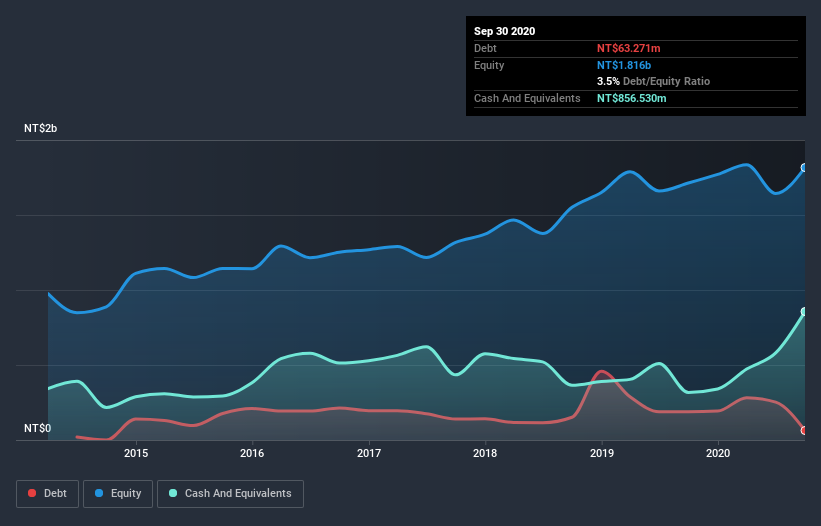
Howard Marks put it nicely when he said that, rather than worrying about share price volatility, 'The possibility of permanent loss is the risk I worry about... and every practical investor I know worries about.' When we think about how risky a company is, we always like to look at its use of debt, since debt overload can lead to ruin. We can see that Farcent Enterprise Co., Ltd (TPE:1730) does use debt in its business. But the real question is whether this debt is making the company risky.
What Risk Does Debt Bring?
Generally speaking, debt only becomes a real problem when a company can't easily pay it off, either by raising capital or with its own cash flow. In the worst case scenario, a company can go bankrupt if it cannot pay its creditors. However, a more frequent (but still costly) occurrence is where a company must issue shares at bargain-basement prices, permanently diluting shareholders, just to shore up its balance sheet. Of course, debt can be an important tool in businesses, particularly capital heavy businesses. When we examine debt levels, we first consider both cash and debt levels, together.
See our latest analysis for Farcent Enterprise
What Is Farcent Enterprise's Net Debt?
As you can see below, Farcent Enterprise had NT$63.3m of debt at September 2020, down from NT$188.0m a year prior. But on the other hand it also has NT$856.5m in cash, leading to a NT$793.3m net cash position.

How Healthy Is Farcent Enterprise's Balance Sheet?
The latest balance sheet data shows that Farcent Enterprise had liabilities of NT$655.2m due within a year, and liabilities of NT$41.1m falling due after that. Offsetting this, it had NT$856.5m in cash and NT$641.1m in receivables that were due within 12 months. So it actually has NT$801.4m more liquid assets than total liabilities.
This surplus suggests that Farcent Enterprise is using debt in a way that is appears to be both safe and conservative. Due to its strong net asset position, it is not likely to face issues with its lenders. Succinctly put, Farcent Enterprise boasts net cash, so it's fair to say it does not have a heavy debt load!
In fact Farcent Enterprise's saving grace is its low debt levels, because its EBIT has tanked 38% in the last twelve months. When it comes to paying off debt, falling earnings are no more useful than sugary sodas are for your health. When analysing debt levels, the balance sheet is the obvious place to start. But you can't view debt in total isolation; since Farcent Enterprise will need earnings to service that debt. So if you're keen to discover more about its earnings, it might be worth checking out this graph of its long term earnings trend.
But our final consideration is also important, because a company cannot pay debt with paper profits; it needs cold hard cash. While Farcent Enterprise has net cash on its balance sheet, it's still worth taking a look at its ability to convert earnings before interest and tax (EBIT) to free cash flow, to help us understand how quickly it is building (or eroding) that cash balance. Over the last three years, Farcent Enterprise reported free cash flow worth 18% of its EBIT, which is really quite low. For us, cash conversion that low sparks a little paranoia about is ability to extinguish debt.
Summing up
While we empathize with investors who find debt concerning, you should keep in mind that Farcent Enterprise has net cash of NT$793.3m, as well as more liquid assets than liabilities. So we are not troubled with Farcent Enterprise's debt use. When analysing debt levels, the balance sheet is the obvious place to start. However, not all investment risk resides within the balance sheet - far from it. To that end, you should learn about the 2 warning signs we've spotted with Farcent Enterprise (including 1 which makes us a bit uncomfortable) .
If you're interested in investing in businesses that can grow profits without the burden of debt, then check out this free list of growing businesses that have net cash on the balance sheet.
When trading Farcent Enterprise or any other investment, use the platform considered by many to be the Professional's Gateway to the Worlds Market, Interactive Brokers. You get the lowest-cost* trading on stocks, options, futures, forex, bonds and funds worldwide from a single integrated account. Promoted
New: AI Stock Screener & Alerts
Our new AI Stock Screener scans the market every day to uncover opportunities.
• Dividend Powerhouses (3%+ Yield)
• Undervalued Small Caps with Insider Buying
• High growth Tech and AI Companies
Or build your own from over 50 metrics.
This article by Simply Wall St is general in nature. It does not constitute a recommendation to buy or sell any stock, and does not take account of your objectives, or your financial situation. We aim to bring you long-term focused analysis driven by fundamental data. Note that our analysis may not factor in the latest price-sensitive company announcements or qualitative material. Simply Wall St has no position in any stocks mentioned.
*Interactive Brokers Rated Lowest Cost Broker by StockBrokers.com Annual Online Review 2020
Have feedback on this article? Concerned about the content? Get in touch with us directly. Alternatively, email editorial-team (at) simplywallst.com.
About TWSE:1730
Flawless balance sheet established dividend payer.
Similar Companies
Market Insights
Community Narratives


